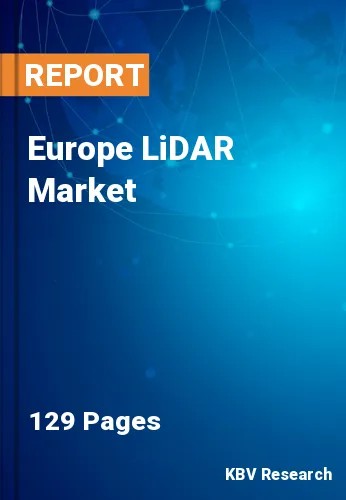
The Europe LiDAR Market would witness market growth of 18.1% CAGR during the forecast period (2022-2028).
In forestry, LiDAR offers a wide range of uses. For example, airborne LiDAR devices can study leaf area, biomass measures, and canopy heights. Similar to this, numerous industries, such as the department of transportation, the railroad, and energy, use LiDAR as a quicker method of surveying. LiDAR can also easily produce topographic maps, including those used for orienteering and other recreational activities. To measure and evaluate the biodiversity of fungi, plants, and animals, LiDAR has also been used.
In many smart city projects, advanced 3D & 4D LiDARs are widely used to build maps and, more precisely, examine the construction site. The need for 4D and 3D imaging solutions is significantly increasing along with the enormous expansion of smart city projects as well as industrial manufacturing applications. Traditional 3D imaging technologies, such as cameras, radar, and others, cannot identify microscopic things. In contrast, LiDAR technology makes an exact duplicate of the object and employs a shorter wavelength to identify various down to the microscopic level.
LiDAR systems are employed in numerous industrial applications, such as semiconductor production, robotics, and factory automation, owing to their remarkable capabilities. Additionally, manufacturing firms are putting LiDAR systems to use in their facilities to find solutions to various complex issues and build highly accurate 3D models simultaneously.
The UK government has been collecting LiDAR data as well as making it accessible to the public for many years. The data could aid in the visualization of ancient landscapes. The region is also well known for its automobile industry. The French government is working to enhance autonomous driving technology and has ambitions to put highly automated cars on public roads. The government sought to establish a legal framework to enable the use of autonomous transportation and the mobility of third-generation driverless cars. Such guidelines and initiatives have aided LiDAR producers' efforts and fueled the growth of the LiDAR market.
The Germany market dominated the Europe LiDAR Market by Country in 2021; thereby, achieving a market value of $228.6 million by 2028. The UK market is exhibiting a CAGR of 17.1% during (2022 - 2028). Additionally, The France market would experience a CAGR of 19% during (2022 - 2028).
Based on Type, the market is segmented into Mechanical and Solid-state. Based on Range, the market is segmented into Short Range, Medium Range and Long Range. Based on Service, the market is segmented into Ground-based surveying, GIS Service, Asset Management, Aerial Surveying and Others. Based on Component, the market is segmented into Laser Scanner, Navigation & Positioning System and Others. Based on Installation Type, the market is segmented into Ground-based and Airborne. Based on Application, the market is segmented into Environment, Exploration, Meteorology, Corridor Mapping, Engineering, Urban Planning, ADAS & Driverless Cars and Others. Based on countries, the market is segmented into Germany, UK, France, Russia, Spain, Italy, and Rest of Europe.
Free Valuable Insights: The Global LiDAR Market will Hit $3.5 Billion by 2028, at a CAGR of 18.4%
The market research report covers the analysis of key stake holders of the market. Key companies profiled in the report include Sick AG, FARO Technologies, Inc., Teledyne Optech, Inc., Trimble, Inc., Hexagon AB (Leica Geosystems AG), NV5 Global, Inc., YellowScans, SureStar, GeoDigital and RIEGL Laser Measurement Systems GmbH.
By Type
By Range
By Service
By Component
By Installation Type
By Application
By Country
Our team of dedicated experts can provide you with attractive expansion opportunities for your business.
